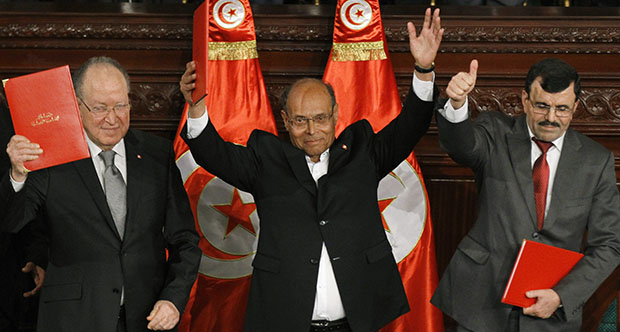 As Egypt’s three-year-old popular uprising has cycled into new violence and repression, Tunisia and Yemen offer a counterpoint of hope with their tangible steps toward democracy this month, write Stefanie Hausheer and Lara Talverdian of the Atlantic Council. Tunisians approved a constitution “hailed by observers as the most progressive in the region with its guarantees for equal rights for women,” they note in a recent post on the Council’s MENASource blog. In Yemen, a conference of 565 representatives completed a National Dialogue that sets core principles for the passage of a new Yemeni constitution, writes Danya Greenfield in a BBC article.
As Egypt’s three-year-old popular uprising has cycled into new violence and repression, Tunisia and Yemen offer a counterpoint of hope with their tangible steps toward democracy this month, write Stefanie Hausheer and Lara Talverdian of the Atlantic Council. Tunisians approved a constitution “hailed by observers as the most progressive in the region with its guarantees for equal rights for women,” they note in a recent post on the Council’s MENASource blog. In Yemen, a conference of 565 representatives completed a National Dialogue that sets core principles for the passage of a new Yemeni constitution, writes Danya Greenfield in a BBC article.
Tunisia’s charter is nothing less than “the region’s first democratic constitution,” says Duncan Pickard, a Tunisia and Libya specialist, in a report that sets the stage as Tunisians now move to prepare elections. “The biggest open question is whether the constitution-making process has convinced a broad enough group of political elites that they will have a stake in the future of the country,” Pickard writes.
While Yemen’s National Dialogue is a big step toward national conciliation, it has fallen short of resolving the country’s most volatile internal conflicts. “Nor will it improve economic conditions or mitigate malnutrition … that plague most Yemenis,” writes Danya Greenfield, acting director of the Council’s Rafik Hariri Center for the Middle East. The government’s failure to reduce violence and poverty keeps the risks remain high as Yemen moves to write its constitution and hold elections. It is “vitally important that international partners remain actively engaged and supportive” of Yemen in this next phase, says the Yemen Policy Initiative, a project co-led by the Atlantic Council.
The Atlantic Council is tracking the Arab world’s divergent political transitions and upheavals with reports on these issues, among others:
- LIBYA’S TORTUOUS ROAD TO A CONSTITUTION. As violence in Syria and Egypt hold most of the global attention on the Arab world, it’s easy to overlook the hazards of Libya. As uncontrolled militias still fill much of the country’s power vacuum (even assassinating or kidnapping government officials), the early constitutional process in Libya faces a morass of troubles, note Duncan Pickard and Senior Fellow Karim Mezran. A 2011 decision by Libya’s transitional government ordains that a new constitution will be drafted by an assembly of sixty people, twenty from each of the country’s Ottoman-era provinces. The group’s tiny size may prevent the adequate representation of all important groups in Libya, the more so because it must accommodate quotas for the representation of women and ethnic minorities. International help for the Libyan process is going to be critical, Pickard and Mezran write.
- THE ECONOMIC WILD CARDS IN YEMEN, TUNISIA AND LIBYA. Danya Greenfield reported recently on how Yemen’s government must take basic steps to improve the economy, if its hopeful start toward stabilization is to be sustained. “The ability of the Yemeni government to deliver concrete benefits to its population has never been more important in order to maintain credibility and foster a sense of forward momentum,” she writes. In Libya, the economy may pose an even greater risk, given the country’s utter dependency on the oil sector, note the Hariri Center’s Senior Fellow Mohsin Khan and Assistant Director Svetlana Milbert. And in Tunisia, the new caretaker government must revive growth and create opportunities for youth, Milbert writes.
- LONG-TERM POSSIBILITIES IN EGYPT. Senior Fellow Amy Hawthorne notes that, although the near-term prospects for democracy in Egypt are bleak, the United States can take concrete steps to promote democratic change over the longer term. Analyses such as hers and daily news updates are on our EgyptSource blog. A new, interactive timeline organizes the history of Egypt’s upheaval – from the protests of the first “Day of Anger” against the military-backed government of President Hosni Mubarak to the events this month that have raised the prospect of another armed forces general becoming president.
- HOW BEST TO STOP CIVIL WAR IN SYRIA? Senior Fellow Fred Hof continues his thread of analysis on the civil war in Syria and the responses to it by the US and other world powers. This week’s New Yorker profile of President Obama, including his decision making on Syria, is further evidence that the president has failed to see opportunities for a calibrated use of force, Hof writes. “Aerial assaults on [Assad] regime artillery, military aircraft, rockets, and missiles would not have required or produced the invasion and occupation of Syria,” Hof says.
The Atlantic Council and its Rafik Hariri Center on the Middle East will maintain full coverage of each of the Arab transitions, and the policy choices they raise for the United States and the international community. You can track developments by country on our pages dedicated to Egypt, Libya, Syria, Tunisia and Yemen. And follow us on Facebook and at @AtlanticCouncil on Twitter.
Image: Tunisia's National Assembly President Mustapha Ben Jaafar, President Moncef Marzouki and outgoing Prime Minister Ali Larayedh pose after signing the country's new constitution in Tunis January 27, 2014. REUTERS/Anis Mili
